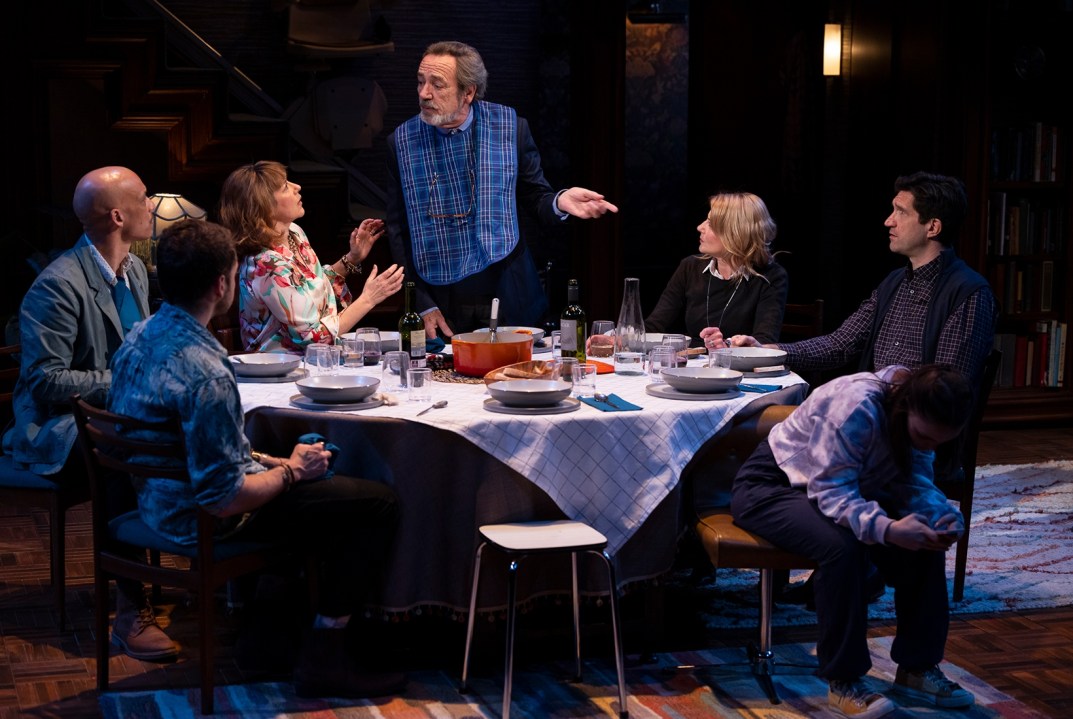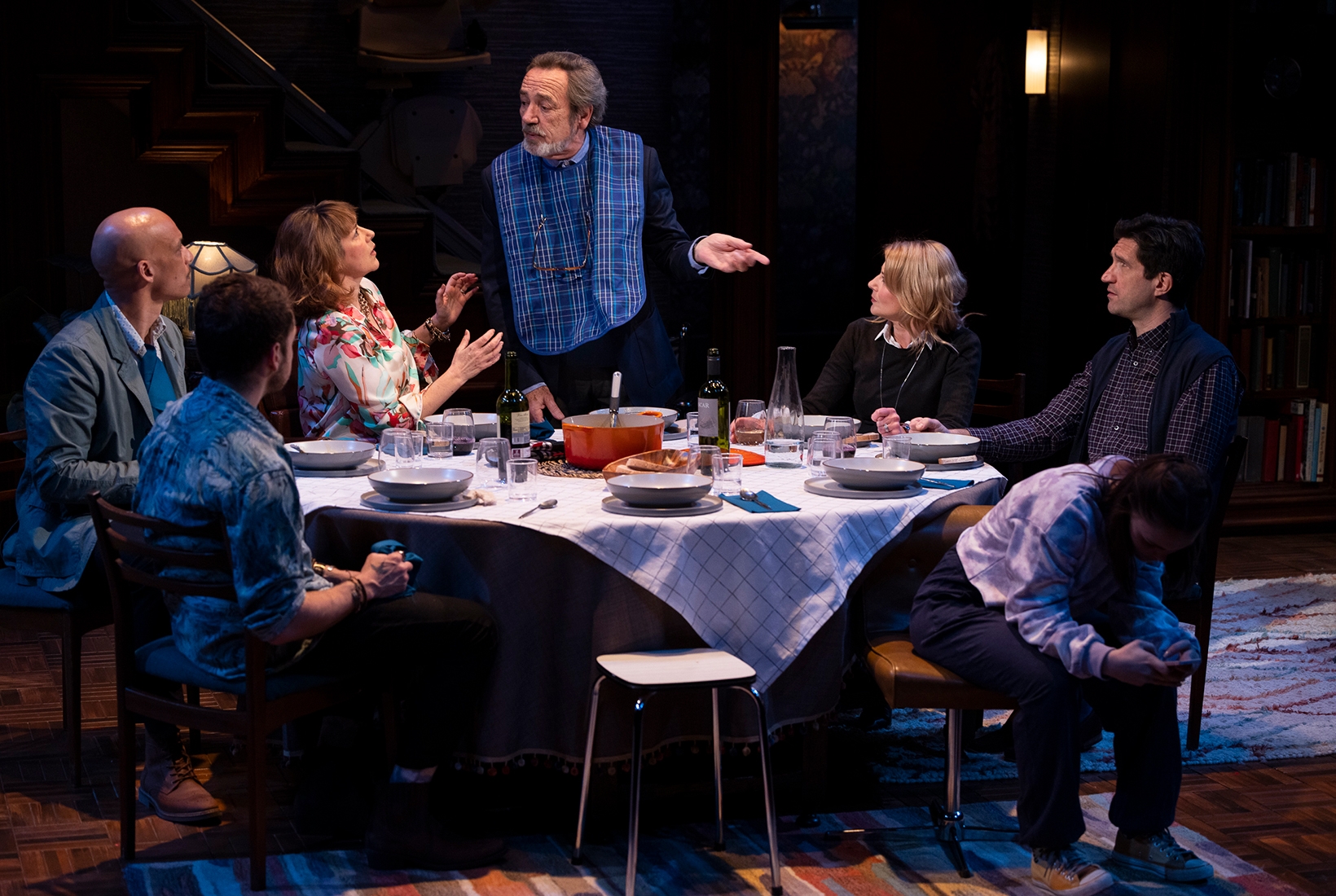The Fever Syndrome is a dramatised lecture set in a New York brownstone occupied by the super-brainy Myers family. The old man, Prof. Richard, is an IVF expert whose daughter, Dot, wants to defrost her embryos and have a second baby. Cue lots of chat about in vitro technology in the 1970s. Dot’s daughter, Lily, has a hereditary ailment that causes epileptic seizures. This, too, is discussed in further Ted Talk passages. And Prof. Richard suffers from incontinence and Parkinson’s disease so these conditions are aired as well. It’s perfectly riveting for medics. Less so for civilians who may not share the view of the Myers family that everyone in the Myers family is a world-class intellectual.
Robert Lindsay stars as Prof. Richard but he’s far too athletic to play an enfeebled patriarch. He keeps springing out of his wheelchair like a fidgety boy scout. And the designer hasn’t even bothered to add a few white streaks to his Rick Astley quiff. The prof. is an embittered curmudgeon who outlines his scientific views in a passage that seems to date from 2008, when Sarah Palin was a candidate for the vice-presidency. ‘We do not have time to get into debates with dim-witted governors of Alaska. You have to ignore the dissenters. You have to be elitist, arrogant, tenacious. You have to be a god.’
Some have suggested that Lindsay took the role because it’s a modern Lear. The true reason becomes clear at the end of Act One when he gets to eat a hot supper on stage. The food is real. You can smell it. Actors love free grub.
Apart from the medical debates, the characters cope with various family crises but the dramatic temperature never rises above the level of The Archers or The Brady Bunch. Will the gay son, Thomas, get married? Can the financial wizard, Anthony, explain why he lost a fortune in Bitcoin during a temporary dip in the market? Should the children kick out Prof. Richard and shove him in a care home? One snag is that no one seems to know who owns the property. It’s not clear that the writer does either. In the programme notes, she likens herself to Arthur Miller. ‘We all walk in the shadows of greatness,’ she says. The script was written at the behest of the Manhattan Theatre Club and yet the world première was staged at the subsidised Hampstead Theatre. Maybe Manhattan got cold feet. Are British audiences being used as guinea pigs for a script that was commissioned overseas? It seems a rum deal for the taxpayer.
The Almeida has another American show, Daddy, first staged in 2019. A young artist, Franklin, is seduced by a gay millionaire, Andre, who wants to promote his work and make him rich. That’s the basis of their romance: Andre is a sugar daddy in search of a trophy and Franklin is a rent boy expecting a pay-off. It’s hard to care how this exploitative relationship develops.
Not that it does much. Franklin brings his narcissistic chums over to Andre’s LA mansion where they lounge beside the pool and gossip about designer sunglasses. There’s a water feature on stage and the characters disrobe and frolic in the shallows while singing George Michael tunes. To amuse themselves they fling armfuls of water over the audience. Rather a contemptuous prank. At press night, not everyone in the crowd wanted to be soused in bilge.
Franklin’s paintings are never shown to us but we’re told that they become valuable only after a clever publicist composes a press release that convinces the critics to salute him as a genius. Is it really that easy? Every character seems to believe that modern art is a hoax run by con men, and they can’t wait to join in. The only honourable character is Franklin’s mum, a devout Christian, whom Andre humiliates by petting and kissing her son while she watches. Then Andre kneels and proposes marriage. But if Andre really cared about Franklin, he’d treat his mother respectfully and not demolish her faith and grind her nose in the debris. However, this unpleasant scene is typical of the script’s flimsy dialogue and self-centred characterisation.
But let’s not overstate the show’s complexity. In fact, it would be unfair to call the author, Jeremy O. Harris, a playwright. This is a theatrical production but it’s not a play. Act One is a sketch show with nudism and songs. Act Two is a medley of self-admiring speeches at a wedding. To distract the audience, the company includes a female gospel choir who wear white bed sheets awnd perform little dances with their hands. Sometimes they stitch dolls together at a sewing table off to one side. It’s not enough to fill the screaming void. Could the Arts Council pay Americans to keep this stuff in America?








Comments